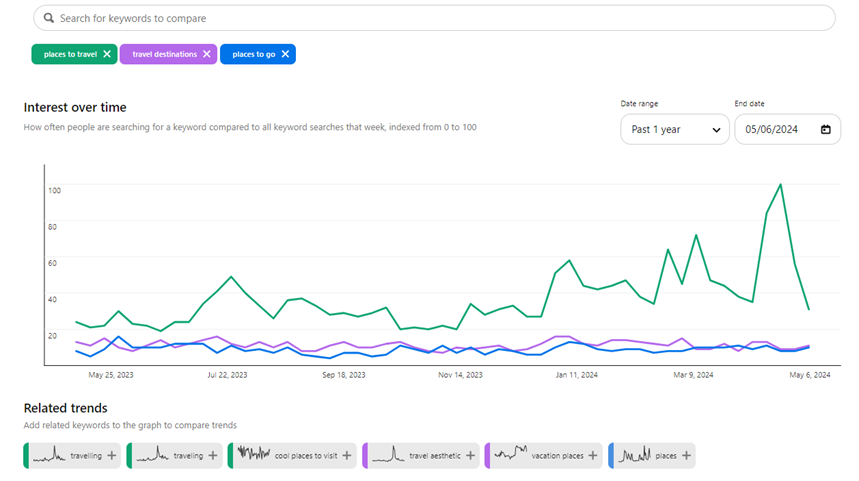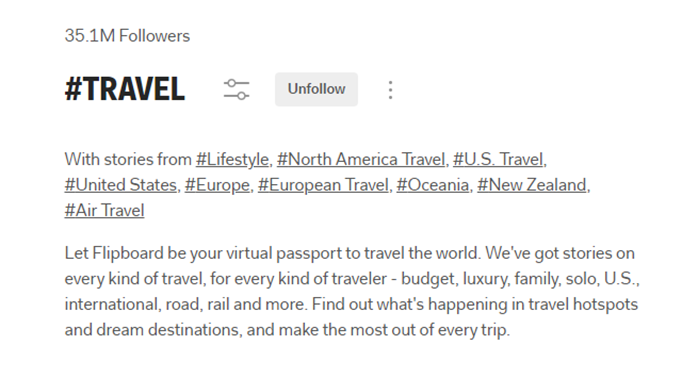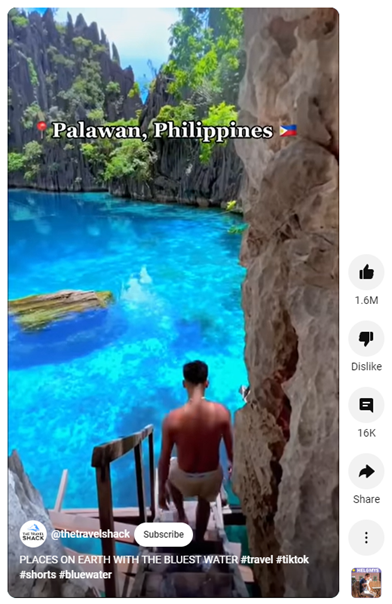This post was sponsored by Stay22. The opinions expressed in this article are the sponsor’s own.
The latest Google update hit our partners – travel bloggers – hard. Despite the challenges presented by this update, we are amazed by their resilience.
Although we cannot influence Google, we can definitely take charge of the things within our reach.
Here are five travel blogger-tested ways to increase website traffic after the latest Google update.
In This Guide
- 1. Use Pinterest As An Additional Search Engine
- 2. Keep Visitors Engaged With Email Marketing
- 3. Add Your Content To Flipboard To Grab More Website Visits
- 4. Get Discovered With Short-Form Videos On Social Media
- 5. Expose Yourself To New Audiences With Guest Posting
- 6. Compensate For Traffic Dips By Maximizing Your Revenue.
Get the most out of each visitor. Check out our guide, Ten Tips for Maximizing Revenue for Travel Bloggers.
1. Use Pinterest As An Additional Search Engine
Many people think of Pinterest as a social media platform, but it functions much more as a search engine.
Pinterest’s tools make it a fantastic way to get visitors to your website.
How To Get Started With Pinterest
- Create a new business account or link/convert a personal account to gain access to business tools like Pinterest Business Hub and Pinterest Analytics, which allow you to monitor searches and keywords.
- Write a catchy bio for your profile. If you have niche keywords you use on your website, include them here.
- Claim your website, allowing you to track whenever someone shares your website content on Pinterest. Additionally, it will automatically include your Pinterest profile and a follow button so you can attract more visitors.
How To Use Pinterest Like A Pro
Pinterest is built around pictures, so having great visuals is critical. You want to make yours stand out on the page.
- When you travel, snap many pictures and pick the best ones later.
- Use design tools like Canva to add text, create interesting layouts, and add branding elements.
- Create boards to organize your content into categories, such as by destination or blog post type.
- Just like any other search engine, keyword research is necessary on Pinterest. Use business tools like Pinterest Trends, which lets you see keyword search volume and which pins are most popular for them.
- Use your selected keywords everywhere possible, including pin titles, pin descriptions, and board descriptions.
 Screenshot from Pinterest Trends, June 2024
Screenshot from Pinterest Trends, June 2024Before you start pinning, optimize your blog posts to maximize revenue to ensure every visitor counts. See how to do that in our guide Ten Tips for Maximizing Revenue for Travel Bloggers.
2. Keep Visitors Engaged With Email Marketing
Email marketing is important because you own it. Instagram could ban your account, Google can derank you, but your email list is always yours.
Use this strategy to build less volatile, consistent traffic instead of new traffic.
How To Get Started With Email Marketing
- Select an email marketing provider. Travel bloggers love MailerLite and MailChimp because they are low-cost and simple.
- Start collecting email addresses. Create a mailing list signup form with your website host and insert it at the end of posts to collect your readers’ information.
How To Use Email Marketing Like A Pro
- Create a lead magnet that entices readers to share their information in exchange for it. Popular lead magnets in the travel blogging community are travel guides, ebooks, and itineraries.
- The goal of email is to get your reader onto your site. Keep your emails short and include impressive pictures and a clear link to your website. Leave them wanting more so that they click through.
- Before sending an email directing traffic to one of your pages, ensure the page is set up to maximize revenue. See how in our guide, Ten Tips for Maximizing Revenue for Travel Bloggers.
“While SEO is often touted as the king of traffic, good email marketing is the absolute queen. We regularly see spikes in our web analytics when we email our audience, but those spikes aren’t just temporary. They help our users build habits. We simply wouldn’t have nearly the business we have today without activating our email list.”
3. Add Your Content To Flipboard To Grab More Website Visits
Flipboard is an article curation website that lets users flip through articles from different publications, like magazines.
How To Get Started With Flipboard
- Download the Flipboard app on mobile and create an account and profile.
- Create Flipboard magazines. These are topic categories that group your content (much like Pinterest boards).
- Add your blog posts to them from the magazine page on Flipboard or the Flipit Chrome bookmark.
 Screenshot taken from Flipboard, June 2024
Screenshot taken from Flipboard, June 2024How To Use Flipboard Like A Pro
- Add your fresh blog posts to Flipboard right after publishing.
- Add relevant content to your magazines that isn’t your own. Engaging with other bloggers’ content and maintaining new content in your magazines helps your reach.
- Include your target keywords in your magazine descriptions, post captions, and profile.
“Flipboard has become a major traffic source for all 3 of my websites. They have fantastic tools for creators, like storyboards, scheduling, and RSS feeds for magazines, making creating and sharing compelling content easy.”
Amanda O’Brien, theboutiqueadventurer.com Founder
4. Get Discovered With Short-Form Videos On Social Media
Did you know 77% of travelers use social media when planning their trips? Get their eyes on your content with short-form videos on platforms like TikTok, Instagram, and YouTube shorts.
These platforms have algorithms to serve your content to people who don’t follow you, making them ideal for readers to discover you.
How To Get Started Making Videos
- Create your accounts on YouTube, Instagram, and TikTok.
- Download Capcut, a free mobile app for video editing. It’s better than the in-app editing functionality, with pre-installed templates and effects.
- Create a Linktree account or an alternative. All three platforms make it difficult for users to leave and visit your site, so a place where users can go for all your links is necessary.
 “PLACES ON EARTH WITH THE BLUEST WATER” by @thetravelshack, June 2024
“PLACES ON EARTH WITH THE BLUEST WATER” by @thetravelshack, June 2024How To Make Short Video Content Like A Pro
- While traveling, keep video creation in the back of your mind. When you see eye-catching scenery or an interesting environment, be ready to capture it in video. Your video’s “wow” factor differentiates between a mediocre and a fantastic video.
- On Instagram, write detailed captions. On YouTube and TikTok, keep captions as brief as possible.
- Voice-over, on-screen text, and music are crucial to your engagement rate. You can add these with Capcut or in-app.
- Pick your video thumbnails carefully. Make sure they stand out in a grid of other videos.
- Finally, keep your short video short. The ideal length for a Reel is seven to eleven seconds, a TikTok 21 to 34 seconds, and a YouTube Short 25 to 35 seconds.
“TikTok helped us to get our second blog on Mediavine. We shared detailed videos about “how to do something” and always included a call to action, directing viewers to our blog for more information. In recent years, we’ve had videos go viral while encouraging followers to visit the link in our bio. This has resulted in thousands of clicks to our websites.”
Natasha Alden, theworldpursuit.com Co-Founder
5. Expose Yourself To New Audiences With Guest Posting
Having your writing published on another website gives you access to a whole new audience, making it an excellent strategy for attracting new readers.
How To Start Guest Posting
- Find places that accept guest posts. Many publications have open submissions that you can submit to.
- If you see a site that has guest posts but no open submissions, find their contact information and send an inquiry email.
- Create a pitch by explaining your travel expertise and provide writing samples.
How To Guest Post Like A Pro
- When creating your pitch, understand the site’s needs. What content gaps do they have? Focus your pitch there.
- Organic guest posting opportunities arise if you take the time to network. Meeting and developing friendships with travel bloggers is a great way to share audiences. You can network on social media, as well as in-person events like TBEX, TravelCon, and Traverse.
- Create a clear link back to your blog and include a catchy description so readers will be enticed to read more of your content.
- Strategize by monitoring the traffic of potential sites with tools like SEMRush and pick the best option.
 Screenshot from japan.travel, June 2024
Screenshot from japan.travel, June 2024“Creating content for another publication to share as a standalone article allows you to share new expertise about a certain area. Whether through the article itself or subsequent social shares, a new audience gets exposure to you as a writer.”
William Tang, goingawesomeplaces.com Founder
See how William Tang made travel blogging his full-time job with the help of Stay22’s revenue-boosting tools. Read the case study.
Compensate For Traffic Dips By Maximizing Your Revenue.
Maximize your conversions with strategic CTA placement and Stay22’s cutting-edge AI-powered affiliate tools! Skyrocket your affiliate sales with these proven tips:
DOWNLOAD OUR GUIDE: Ten Tips for Maximizing Revenue for Travel Bloggers.
Image Credits
Featured Image: Image by Shutterstock. Used with permission.






